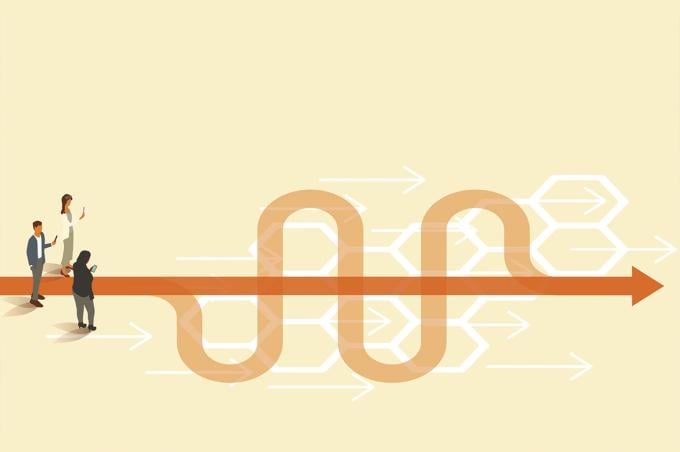One of the most important factors in determining whether physicians and other health professionals will experience symptoms of burnout is whether they feel valued. But until recently, no large-scale research had been done on what health care organizations and leaders can do to help to bring about that feeling.
A study published earlier this year in the journal BMJ Leader—cowritten by the AMA’s Christine Sinsky, MD, Jill Jin, MD, and Nancy Nankivil—digs into what, specifically, contributes to health care workers feeling valued by their organizations.
The study discovered that 45% of physicians and other health professionals felt valued by their organization when surveyed early in the COVID-19 pandemic. Those who felt highly valued had 8.3 times lower odds of burnout and 10.2 times lower odds of intending to leave compared with those who didn’t feel valued at all.
When physicians and other health professionals “feel valued, they are less burned out and less likely to leave their jobs,” the study says.
The negative repercussions of burnout on health care organizations, society and physicians themselves are multifold and well-documented. And though physician burnout has dropped from the record-high rate in 2021, burnout rates remain high and concerning.
That’s why, as the leader in physician well-being, the AMA is reducing physician burnout by removing administrative burdens and providing real-world solutions to help doctors rediscover the Joy in Medicine™.
Whether physicians feel valued is a key component of the AMA’s Organizational Biopsy® and assessing it can help show the impact that burnout has on a health care organization.
For the BMJ Leader study, researchers analyzed survey responses from 37,685 physicians, nonphysician providers, nurses and other clinical staff on feeling valued by their organizations.
The study uncovered six themes associated with feeling valued that translated across the different types of roles.
Physical safety
With the survey conducted in 2020, physical safety and health were at the forefront of many respondents’ minds.
Physicians and other health professionals reported feeling valued when their physical safety was considered important by health care leaders. They mentioned appreciating having adequate personal protective equipment (PPE), as well as access to testing and screening for COVID-19. Respondents also discussed how the ability to practice telemedicine indicated their physical well-being was a priority for their organization.
On the flip side, however, those who said they did not feel valued displayed frustration that their personal safety was seemingly less important than their health care organization’s productivity goals.
Compensation and system finances
The study authors noted that physicians who did not feel valued often mentioned that their health care organizations seemed to prioritize financial success over high-quality patient care. Nonphysicians such as nurses mentioned furloughs, pay cuts, denied vacation and lower pay as indications of why they did not feel valued by their organizations.
Transparent, frequent communication
The quality and frequency of communication was mentioned across all the health professionals surveyed, the study says. Those who felt valued indicated they heard from multiple sources of information within their organizations, whether it was from high-level leaders or general sources.
Alternatively, physicians who did not feel valued said they were frustrated that it seems as though decisions were being made within their health care organizations by leaders without the appropriate levels of knowledge, background or experience. They also expressed a desire for more input on decision-making and more understanding of the rationales behind such decisions.
Effective teamwork
Physicians and other health professionals who felt valued reported the importance of teamwork in their organizations, according to the study, which also noted a “striking” absence of comments about teamwork in those who did not feel similarly.
The physicians and health professionals who reported feeling valued indicated there was increased camaraderie during periods of pandemic-related stress and mentioned that group connections decreased their feelings of isolation.
Empathetic and respectful leaders
Supportive, compassionate and respectful leaders were often mentioned by those who felt valued, the study says. Those leaders were described as being physically present and aware of the needs of their staff. Physicians and other health professionals who did not feel valued, though, typically said their leaders were disconnected, dismissive or even outright abusive of professionals delivering care.
Organizational support
Supportive health care organizations are those that provide the kind of environment that supports individual physicians and other health professionals, as detailed by the respondents who felt valued. Such organizations have adequate staffing, workflow flexibility and policies that promote work-life integration and self-care, such as adequate mental health support, child care and opportunities to work from home when possible.
Physicians who did not feel valued indicated they lacked autonomy, and health professionals who didn’t feel valued often described lacking control, being overworked and working in chaotic environments.
“Through these mechanisms, we anticipate that feelings of value will be enhanced, burnout will be reduced, and intent to stay with the organization will be strengthened for the near and distant future,” the study says.
Overall, the authors concluded, making physicians and other health professionals in a health care organization feel valued is critical to preventing burnout and keeping talented people in the roles where they do so much good. Merely telling health care workers, including physicians, that they are important is not enough. There are specific actions that organizations can take to create an environment conducive to financial success, excellent health care and physicians’ personal fulfilment.




